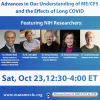Merged thread
===
Source: Clinical Trials
U.S. National Library of Medicine
Date: December 7, 2021
URL:
https://clinicaltrials.gov/ct2/show/NCT02669212
Myalgic Encephalomyelitis Chronic Fatigue at the National
Institutes of Health
---------------------------------------------------------
Brief Summary
Background
Post-Infectious Myalgic Encephalomyelitis/Chronic Fatigue Syndrome (PI-ME/CFS) refers to long-lasting and disabling fatigue or malaise, inability to recover after exercise, and physical and emotional discomfort that may occur after a person has an infection. Researchers want to learn more about its causes.
Objective
To learn more about PI-ME/CFS.
Eligibility
Adults ages 18-60 years who have finished at least 7th grade education and either:
* have ME/CFS that started after an infection
* OR had Lyme disease, were treated, and returned to normal health
* OR are healthy volunteers
Design:
Participants will initially have a 2-5 day inpatient visit at the National Institutes of Health Clinical Center in Bethesda. During the visit, participants will have:
Medical history
* Physical exam
* Intravenous (IV) line. A thin plastic tube is inserted into a vein.
* Blood and urine collected
* Magnetic resonance imaging (MRI). Participants will lie in a machine that takes pictures of their brain. They may get a dye through their IV.
* Grip strength tested
* Saliva, cheek swab, and stool collected
* Tilt table test with measures of body functions such as sweating and breathing, blood pressure, and heart rate and blood and urine sample collection
* Collection of blood cells. Participants can choose to have the blood drawn through the IV or through a machine that filters blood cells and returns the liquid blood back into the participant s vein.
* Lumbar puncture. Fluid will be removed by placement of a needle between the back bones.
* Heart monitoring
*Sleep study for participants with PI ME/CFS
* Questions about the participant s life and how they are feeling
* Questions from a neuropsychologist
* Questions from an occupational therapist for participants with PI ME/CFS
* Questinos from a nutritionist
After the initial visit participants will return home. Participants evaluated for PI-ME/CFS during the first visit will have their information reviewed by an adjudication panel of experts in the diagnosis and care of ME/CFS to determine if they are eligible to participate in the second study visit.
Eligible participants will be invited back for a second study visit. If a participant was taking certain medications during the first visit, they may be asked to taper off of them prior to the second visit and report any problems. They will also receive an activity monitor, fatigue diary, and nutrition log to use for at least one week prior to their second visit.
Participants who are eligible will return for a 5-10 day inpatient hospital visit at the National Institutes of Health Clinical Center. During the visit, participants will undergo measurements before and up to 96 hours after performing a stationary bike exercise test. The purpose of the exercise test is to provoke ME/CFS symptoms (post-exertional malaise). Tests will be performed before and after exercise testing. These include:
* Sleeping in a room that measures how the body uses energy with EEG monitoring
* Eating a controlled diet
* Performing vigorous exercise for 10-15 minutes
* Questions about how participants are feeling
* Questions about what participants usually eat
* Samples of saliva, blood, urine and stool
* Wearing an activity monitor
* Having an Xray that measures body composition
* Thinking and memory tests
* Heart monitoring
* Transcranial magnetic stimulation. A brief electrical current to the scalp creates a magnetic pulse that affects brain activity.
* Magnetic resonance imaging (MRI). Participants will lie in a machine that takes pictures of their brain. They will do thinking and exercise tasks during the MRI.
* Lumbar puncture. Fluid will be removed by placement of a needle between the back bones.
Study Design
Study Type: Interventional (Clinical Trial)
Estimated Enrollment: 345 participants
Intervention Model: Single Group Assignment
Masking: None (Open Label)
Primary Purpose: Screening
Official Title: Myalgic Encephalomyelitis/Chronic Fatigue Syndrome
Actual Study Start Date: October 10, 2016
Estimated Primary Completion Date

ecember 30, 2024
Estimated Study Completion Date: June 30, 2025
(...)
Contacts and Locations
Contacts
P.I.: Avindra Nath, M.D. National Institute of Neurological Disorders and Stroke (NINDS)
Locations
National Institutes of Health Clinical Center, 9000 Rockville Pike, Bethesda, Maryland, United States, 20892
--------
(c) 2021 U.S. National Library of Medicine
===
from m-a fluks.
===
i think we really need pwme scientific observers / collaborators integrated into their study design etc. [edit: i previously said participants, which was ambiguous.]

